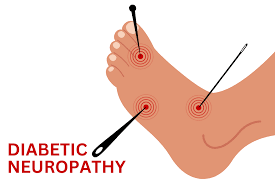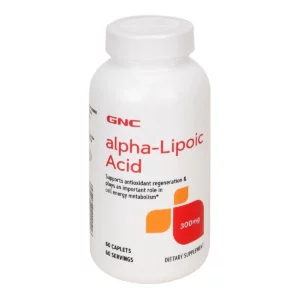Diabetic neuropathy is a common complication of diabetes that affects the nerves throughout the body. It can lead to symptoms such as tingling, numbness, pain, and weakness, particularly in the extremities. While conventional treatments exist, many individuals seek natural remedies to manage diabetic neuropathy symptoms and improve their overall quality of life. In this blog post, we’ll explore various natural approaches that may help alleviate diabetic neuropathy discomfort.
Contents
What is Diabetic Neuropathy?

Diabetic neuropathy is a type of nerve damage that can occur in individuals with diabetes. It is a common complication of diabetes and tends to develop over time, particularly in those who have had the condition for an extended period or have difficulty managing their blood sugar levels. Diabetic neuropathy is primarily caused by prolonged exposure to high levels of glucose in the blood, which can lead to damage to the nerves throughout the body.
There are several types of diabetic neuropathy, each affecting different nerves and presenting with distinct symptoms. The most common types include:
- Peripheral Neuropathy: Peripheral neuropathy affects the nerves in the feet, legs, hands, and arms. Symptoms may include tingling, numbness, burning sensations, and pain in the affected extremities. Loss of sensation can also occur, making it challenging to detect injuries or infections.
- Autonomic Neuropathy: This type of neuropathy affects the autonomic nervous system, which controls involuntary bodily functions such as digestion, heart rate, and blood pressure. Symptoms may include gastrointestinal issues (such as constipation or diarrhea), bladder problems, sexual dysfunction, and difficulty regulating blood pressure.
- Proximal Neuropathy (Diabetic Amyotrophy): Proximal neuropathy affects the nerves in the thighs, hips, buttocks, and legs. Symptoms may include severe pain, muscle weakness, and difficulty moving the affected areas. This type of neuropathy can develop suddenly and is more common in older adults with diabetes.
Risk factors for developing diabetic neuropathy include:
- Poorly controlled blood sugar levels over an extended period.
- Long duration of diabetes.
- Smoking.
- High blood pressure.
- Elevated cholesterol levels.
Why Do Prefer Natural Remedies for Diabetic Neuropathy?
The choice to prefer natural remedies often stems from several factors, and individuals may opt for these approaches for the following reasons:
- Minimization of Side Effects: Many pharmaceutical medications used to manage diabetic neuropathy symptoms may have side effects. Some individuals prefer natural remedies as they are often perceived as gentler on the body and may have fewer adverse effects compared to certain prescription drugs.
- Holistic Approach to Health: Natural remedies are often seen as part of a holistic approach to health, addressing not only the symptoms but also aiming to improve overall well-being. Lifestyle changes, such as dietary modifications, exercise, and stress management, can contribute to a healthier lifestyle beyond symptom management.
- Individualized Treatment: Natural remedies can be easily personalized to an individual’s preferences and tolerances. Some people appreciate the flexibility of trying different herbal supplements, essential oils, or alternative therapies to find what works best for them.
- Prevention of Further Complications: Certain natural remedies, such as a diabetes-friendly diet and regular exercise, not only aim to manage symptoms but also work towards preventing further complications associated with diabetes. By addressing underlying factors like blood sugar control, individuals may reduce the risk of worsening neuropathy and other diabetic complications.
- Complementary Therapies: Some individuals use natural remedies as complementary therapies alongside conventional medical treatments. These approaches may not replace prescribed medications but can work in tandem to enhance overall symptom management.
10 Best Natural Remedies for Diabetic Neuropathy
Determining the “best” natural remedies for diabetic neuropathy can be subjective, as individual responses may vary. However, the following natural remedies have shown promise in managing diabetic neuropathy symptoms and promoting nerve health:
Alpha-Lipoic Acid:

- Description: Alpha-lipoic acid (ALA) is a potent antioxidant that has gained attention for its potential in managing diabetic neuropathy. Found naturally in the body, ALA plays a crucial role in energy production within cells. Studies suggest that ALA may help improve nerve function and reduce symptoms associated with diabetic neuropathy. Its antioxidant properties are believed to neutralize free radicals, reducing oxidative stress and inflammation in the nerves.
- How to Use: ALA supplements are available over-the-counter. Typical doses range from 600 to 1800 mg per day, but individuals should consult with a healthcare professional to determine the appropriate dosage based on their specific health needs.
- Cautions: Side effects may include gastrointestinal issues, and ALA can interact with certain medications. It’s important to discuss the use of ALA with a healthcare provider, especially if taking medications for diabetes.
B-vitamins (B1, B6, B12)
- Description: B-complex vitamins, including B1 (thiamine), B6 (pyridoxine), and B12 (cobalamin), are crucial for nerve health. Deficiencies in these vitamins have been linked to neuropathic symptoms. B1 supports nerve cell function, B6 is involved in nerve signaling, and B12 is essential for nerve cell maintenance and repair.
- How to Use: B-vitamin supplements are widely available, and a balanced diet that includes foods rich in these vitamins is recommended. Dosages should be determined in consultation with a healthcare professional.
- Cautions: While B vitamins are generally considered safe, excessive intake may lead to adverse effects. Individuals with certain medical conditions or those taking specific medications should seek advice from a healthcare provider before supplementing.
Evening Primrose Oil
- Description: Evening primrose oil (EPO) is derived from the seeds of the evening primrose plant and is rich in gamma-linolenic acid (GLA), an essential fatty acid with anti-inflammatory properties. Some studies suggest that EPO may help alleviate neuropathic symptoms by reducing inflammation and improving nerve function.
- How to Use: EPO is available in supplement form. Dosages can vary, and it’s advisable to consult with a healthcare professional to determine the appropriate amount based on individual health needs.
- Cautions: Side effects may include gastrointestinal discomfort, and individuals taking blood-thinning medications should use EPO with caution. It’s essential to discuss the use of EPO with a healthcare provider before incorporating it into the treatment plan.
Ginseng

- Description: Ginseng, derived from the root of the Panax plant, has been used in traditional medicine for its adaptogenic properties. Some research suggests that ginseng may have neuroprotective effects, potentially improving nerve function and reducing neuropathic symptoms.
- How to Use: Ginseng is available in various forms, including supplements and teas. Dosages can vary, and it’s advisable to consult with a healthcare professional to determine the appropriate amount.
- Cautions: Ginseng may interact with certain medications, and excessive intake may lead to side effects. Individuals with diabetes should discuss the use of ginseng with their healthcare provider to ensure it is safe and suitable for their condition.
Acupuncture
- Description: Acupuncture is an ancient Chinese practice involving the insertion of thin needles into specific points on the body. This traditional therapy is believed to stimulate the flow of energy, known as “qi,” and promote overall balance within the body. Some studies suggest that acupuncture may be effective in managing diabetic neuropathy by improving blood circulation, reducing inflammation, and triggering the release of endorphins, which can help alleviate pain and discomfort.
- How to Use: Acupuncture sessions are typically performed by licensed practitioners. The frequency and duration of sessions may vary, and individuals should consult with a qualified acupuncturist to create a personalized treatment plan.
- Cautions: While acupuncture is generally considered safe, it may not be suitable for everyone. Individuals with bleeding disorders or those taking blood-thinning medications should exercise caution and inform their healthcare provider before starting acupuncture.
Essential Oils
- Description: Certain essential oils possess properties that may help manage diabetic neuropathy symptoms, such as pain and tingling. Lavender oil, known for its calming effects, may alleviate neuropathic pain and improve sleep. Peppermint oil, with its cooling properties, could provide relief from tingling sensations. Cypress oil, recognized for its anti-inflammatory properties, may help reduce pain and discomfort associated with neuropathy.
- How to Use: Essential oils can be diluted with a carrier oil and applied topically, diffused, or added to bathwater. It’s essential to perform a patch test before using essential oils and consult with a healthcare professional, especially if there are existing skin sensitivities or respiratory conditions.
- Cautions: Essential oils are potent and should be used with caution. Some individuals may be sensitive or allergic to certain oils. Pregnant individuals or those with specific health conditions should consult with a healthcare provider before using essential oils.
Curcumin (Turmeric)
- Description: Curcumin, the active compound in turmeric, has anti-inflammatory and antioxidant properties. Studies suggest that curcumin may help reduce inflammation and oxidative stress, potentially benefiting individuals with diabetic neuropathy.
- How to Use: Turmeric can be included in the diet, or curcumin supplements are available. Dosages should be determined based on individual health needs and in consultation with a healthcare professional.
- Cautions: Curcumin may interact with certain medications, and excessive intake may lead to gastrointestinal issues. Individuals with gallbladder issues or those taking blood-thinning medications should use curcumin with caution and consult with their healthcare provider.
Magnesium
- Description: Magnesium is an essential mineral that plays a role in nerve function and muscle contraction. Some studies suggest that magnesium supplementation may help alleviate neuropathic symptoms by regulating nerve function and reducing inflammation.
- How to Use: Magnesium supplements are available, and dietary sources include leafy green vegetables, nuts, and whole grains. Dosages should be determined based on individual health needs and in consultation with a healthcare professional.
- Cautions: Excessive magnesium intake can lead to diarrhea and other gastrointestinal issues. Individuals with kidney problems should consult with a healthcare provider before using magnesium supplements.
Capsaicin
- Description: Capsaicin is the active component in chili peppers, and it is known for its analgesic properties. Topical capsaicin creams can be applied to the affected areas, and it is believed to work by desensitizing nerve receptors and reducing the perception of pain signals.
- How to Use: Capsaicin creams are available over-the-counter. It’s important to follow application instructions carefully, and individuals with sensitive skin should perform a patch test before regular use.
- Cautions: Capsaicin can cause a warming or burning sensation, and some individuals may experience skin irritation. Avoid applying capsaicin to broken or irritated skin, and wash hands thoroughly after use to prevent accidental contact with eyes.
Aloe Vera

- Description: Aloe vera, known for its soothing properties, may provide relief for skin-related symptoms of diabetic neuropathy. Applying aloe vera gel to the affected areas may help alleviate itching and dryness associated with nerve damage.
- How to Use: Pure aloe vera gel can be obtained from the leaves of the aloe plant or purchased commercially. Apply a thin layer to the affected skin and repeat as needed.
- Cautions: While aloe vera is generally safe for topical use, individuals with allergies or sensitive skin should test a small amount first. If irritation occurs, discontinue use.
Conclusion
While natural remedies can complement conventional treatments for diabetic neuropathy, it’s crucial to consult with a healthcare professional before making significant changes to your treatment plan. The effectiveness of these remedies can vary from person to person, and individual responses may differ. By combining natural approaches with proper medical care, individuals with diabetic neuropathy can strive to improve their symptoms and enhance their overall quality of life.
Do you want to get rid of diabetes? Join our online diabetes treatment program and reverse Diabetes naturally through lifestyle changes such as a Personalized Diet plan, Exercise, Yoga, dieticians, and health coaches.

